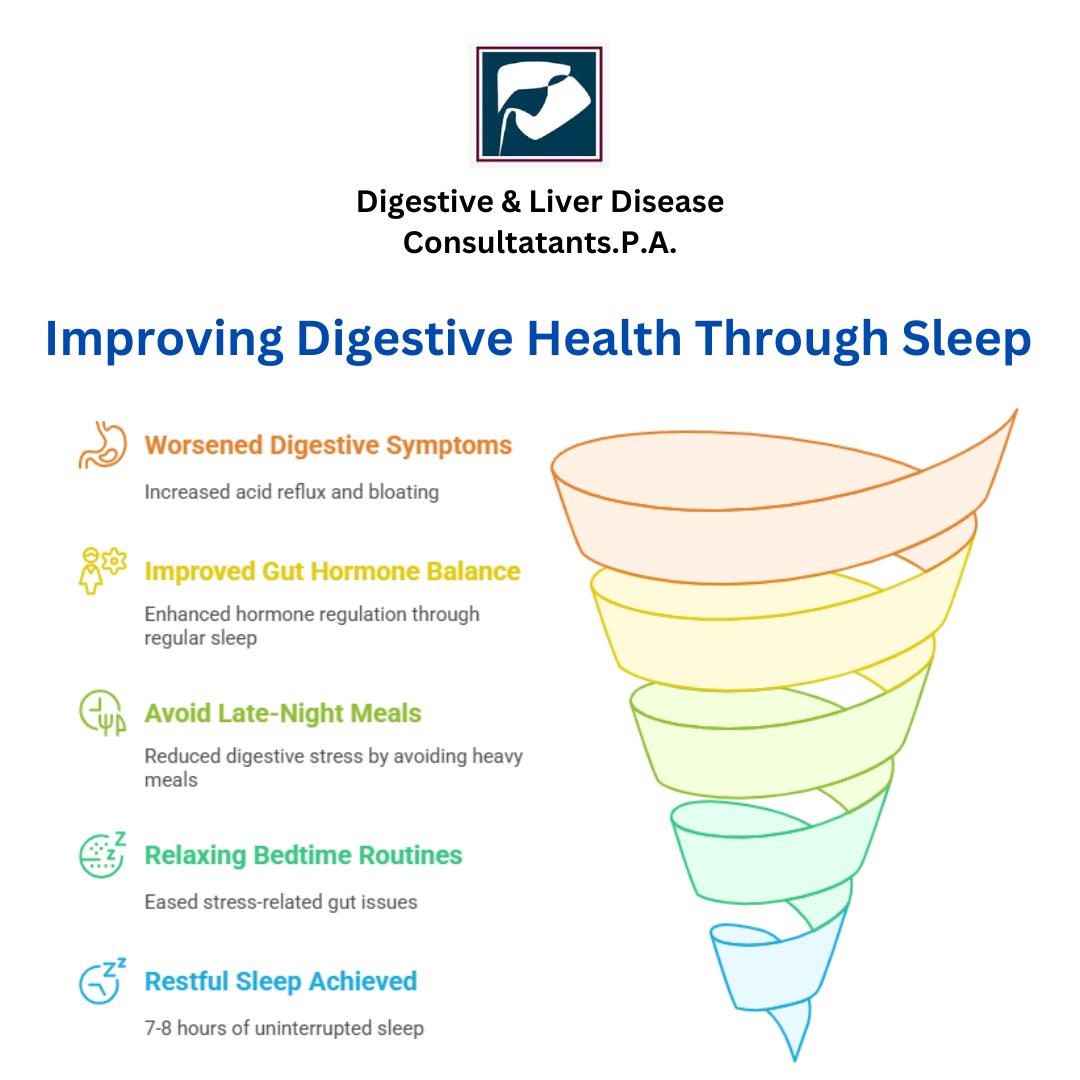When you think about taking care of your digestive system, the first things that likely come to mind are diet, hydration, and exercise. While these are important, there’s another key factor that often gets overlooked — your sleep schedule. Believe it or not, the amount and quality of sleep you get can have a powerful impact on your digestive health.
At Digestive & Liver Disease Consultants, P.A., we often remind our patients that good digestion doesn’t just depend on what you eat, but also how well you rest. In this blog, we’ll explain how your sleep patterns affect your digestive system, why keeping a regular sleep schedule matters, and how you can improve both your sleep and digestive wellness.
How Sleep and Digestion Are Connected
Your digestive system works around the clock to process the food you eat, absorb nutrients, and get rid of waste. But this process isn’t entirely isolated from the rest of your body — it’s closely connected to your brain and nervous system through something called the gut-brain axis. This is a communication network that links your gut and your brain, sending signals back and forth.
When you don’t get enough quality sleep, this communication gets disrupted, which can affect the way your digestive system functions. Poor sleep can cause problems like:
- Slower digestion
- Increased acid production (which can lead to heartburn or acid reflux)
- Changes in appetite hormones, leading to unhealthy cravings
- Digestive discomfort, like bloating and constipation
That’s why a consistent and healthy sleep routine is essential for keeping your gut in good shape.

What Happens to Digestion When You Don’t Sleep Well?
If you’ve ever felt bloated, constipated, or had acid reflux after a restless night, you’re not imagining things. Here’s what actually happens in your body when your sleep schedule is irregular:
1. Sluggish Bowel Movements
When you don’t sleep enough, your body’s natural rhythm (called the circadian rhythm) gets thrown off. This can slow down your bowel movements, leading to constipation and discomfort.
2. Increased Stress Hormones
Lack of sleep causes your body to produce more cortisol, a stress hormone that can trigger digestive issues like cramping, bloating, and nausea.
3. Disrupted Gut Bacteria
Your gut is home to trillions of bacteria that help with digestion and immunity. Poor sleep can disturb the balance of these good bacteria, potentially leading to inflammation, poor digestion, and even conditions like irritable bowel syndrome (IBS).
4. Heartburn and Acid Reflux
Irregular sleep schedules can increase the risk of acid reflux. When you lie down too soon after eating, or eat late at night, stomach acid can travel back up into your esophagus, causing that uncomfortable burning sensation.
The Benefits of a Regular Sleep Schedule for Your Gut
When you stick to a regular sleep schedule, you’re not just helping your brain and body rest — you’re supporting your digestive system too. Here’s how:
1. Balanced Gut Bacteria
A consistent sleep routine keeps your gut microbiome (the community of good bacteria in your gut) healthy and balanced. This helps improve digestion, reduces inflammation, and boosts immunity.
2. Better Bowel Movements
Getting enough sleep helps your body maintain a steady digestive rhythm, making it easier to have regular bowel movements and avoid constipation.
3. Reduced Digestive Discomfort
Quality sleep reduces stress hormones and inflammation in the body, which means fewer stomach cramps, bloating, and indigestion.
4. Lower Risk of Acid Reflux
When you avoid late-night meals and keep a steady bedtime, you give your stomach enough time to digest food before lying down, reducing the risk of acid reflux.
How to Build a Healthy Sleep Schedule for Digestive Wellness
If you want to improve your digestive health by sleeping better, start by setting up a consistent sleep routine. Here are some simple tips to help you get started:
- Stick to a regular bedtime and wake-up time — even on weekends.
- Avoid large meals, spicy foods, and caffeine in the evening to prevent acid reflux and indigestion.
- Limit screen time before bed, as the blue light from phones and TVs can disrupt your body’s sleep-wake cycle.
- Create a calming bedtime routine — reading, taking a warm bath, or practicing relaxation exercises can help.
- Keep your bedroom cool, quiet, and dark for better sleep quality.
Stay active during the day, as regular physical activity can help you sleep better at night.
The Role of Digestive & Liver Disease Consultants, P.A.
At Digestive & Liver Disease Consultants, P.A., we understand that digestive health is about more than just your diet. Our experienced team of gastroenterologists and liver specialists is dedicated to providing comprehensive, personalised care for a wide range of digestive and liver-related conditions.
We treat everything from acid reflux, irritable bowel syndrome (IBS), and constipation to fatty liver disease, hepatitis, and more complex liver and digestive disorders. Our mission is to improve your digestive health and overall wellness through advanced diagnostic tools, expert treatments, and helpful lifestyle guidance, including the often-overlooked importance of sleep.
Conclusion
Good digestion depends on more than just what you eat — it also relies on how well you rest. A regular sleep schedule plays a vital role in maintaining a healthy gut, preventing digestive discomfort, and keeping your entire body in balance. By making sleep a priority, along with a healthy diet and active lifestyle, you can support your digestive system and improve your quality of life.
If you have concerns about how poor sleep may be affecting your gut health, don’t hesitate to reach out. Contact Digestive & Liver Disease Consultants, P.A., today to schedule a consultation.






